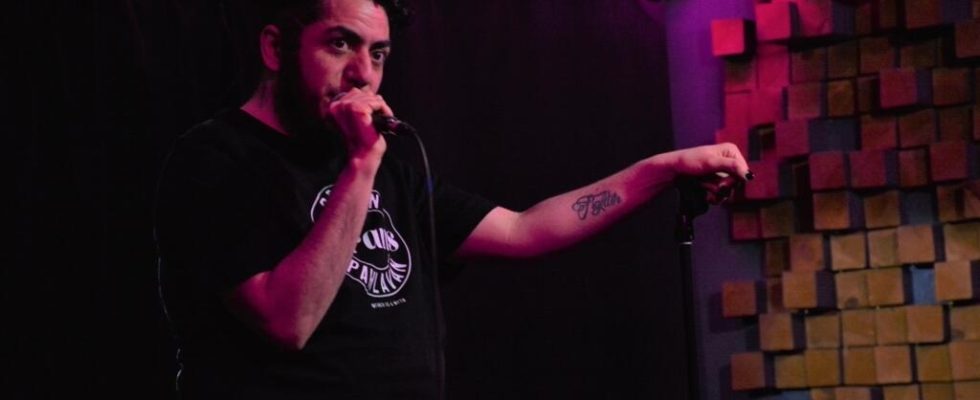Of Iranian origin, born in France and raised in Canada, Sloan Kooshan hesitated for a long time before embarking on stand-up in 2021. The trans immigrant artist has since developed his own informal collective of queer comedians or allies in Montreal. of the diasporas of South-West Asia and North Africa, and hopes to promote all the communities.
From our correspondent in Montreal,
In the dim light of a Montreal bar, Sloan Kooshan, 33, enters the stage to the rapturous applause of the spectators. In ten minutes, the actor naturally connects two stories that have nothing to do with each other: one about an Iranian-Spanish marriage and the embarrassing intervention of a distant relative, the other about symptoms that make him fear an incurable disease. , which will only turn out to be a fairly common skin problem. Laughter bursts out.
This Sunday evening in March, the show brings together six actors and actresses, all from South-West Asia and North Africa. “ The objective is really to promote in a benevolent framework the humor of minorities and diversity, and to make them visible “, explains Sloan at the start of the show. Some are from the queer community, others are not, they all break taboos, make the public laugh and do not hesitate to caricature if necessary. Danah Saleh, for example, a Palestinian-Canadian, has a biting and committed sense of humor for her native land.
Learning despite racism
We find Sloan in a café in Montreal, the day after his show. ” Everyone was very happy with the result, but I felt like I hadn’t managed to attract enough spectators. “, sighs the actor, who relativizes while laughing: “ afterwards, as my father pointed out to me, organizing a show on Persian New Year’s Day, when everyone is with their families and on top of that on a Sunday evening, was not very strategic. »
Sloan is not the type to have a lot of self-confidence: the conditions of his arrival in Canada may not have helped. ” My parents fled the Islamic revolution. I was born in France in 1989, and at seven years old, I arrived in Montreal. I experienced more racism here”, explains the actor. In France, he lived in Champigny-sur-Marne, where many communities supported each other. But in Canada, everything is changing. School harassment, systemic racism, everything goes there, remembers Sloan, a smile despite everything hanging on his face: “ Once, a comrade threw me against a railing like a ball, until it took my breath away. » Disparaging remarks about his origins will even push him to ask his mother to avoid making him Iranian food!
Things get worse after the 9/11 attacks. During this period, Sloan became the target of Islamophobia even though he was not a Muslim, and was persecuted on a daily basis. Moving from one school to another every year, Sloan tries somehow to continue his education. Finally, in 2010, he succeeded in integrating the university in cinema in Montreal. ” I really liked the documentary. Minus the fiction… I remember a scenario of comrades who staged a schizophrenic villain, without them wondering about the impact that these clichés could have. Me, I preferred to stick to reality. » With the film industry clogged, Sloan changed paths after graduating. In the continuity of his reflections on stereotypes, he joined a course in psychology in 2016, to give visibility to trans people in university work. ” I was laughed at when I wanted to change course. Finally, I did six years of study and a thesis on the subject! »
Publicize the struggles
The period of confinement is particularly difficult. Sloan, who left home with his parents, must finish his research in psychology on the impact of sexualized advertisements on trans people and is about to begin his transition after having realized his coming out. ” People cannot imagine the violence that the pandemic has exerted on trans people. Our community has been hit by waves of suicide, many and many of us have been stopped in the middle of transition. »
Its transition is falling behind from the first confinement, in 2020, when the path has already been long. ” In March, I had just been authorized to start hormonal treatment, after months of struggling. I was told, like many trans people, that I was not psychologically stable: but it was precisely the fact of not being able to make my transition that made me feel bad! »the actor is indignant.
Paradoxically, it was during this very difficult period of his life that he found the strength to move forward. ” I decided to stop complaining about my fate. Now I give myself a limited time when I have a hard time, and then I move on “Summarizes Sloan. He takes advantage of the confinement to finish his thesis in psychology, engage in trans activism and follow online training courses on acting. In August 2021, a friend invited her to go on stage to do stand-up: ” It really marked me. I had always dreamed of doing stand-up since I was a teenager, but I had never dared “.
Today, Sloan works in a bank, to pay the rent. At the same time, he continues to work on his shows and has just started improvisational theatre: ” Laughter allows you to send a lot of message, to fight against stereotypes with regard to minorities and diversity. Since the beginning of the revolt in Iran, he has never felt so proud of his Iranian origin. But necessarily, the young humorist fears for his friends who stayed there, so he talks to them less for fear of putting them in danger. An additional motivation to represent the Iranians on stage: “ More than anything, in stand-up, I hope I can be the voice of my people. »
